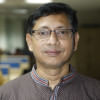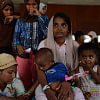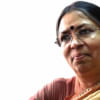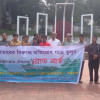Peace, order new year's big challenge
Taking lessons from the past, law enforcement agencies are redoing their strategies to keep law and order under control in this election year.
As part of their plan, police and different intelligence agencies will prepare a fresh list of wanted criminals and probable political troublemakers ahead of the election and launch drives to arrest them. Special drives will also be made to recover illegal firearms, said a number of top police officials.
Records show, crime and violence flared up in 2013 and in early 2014 centring the last parliamentary election, delivering a blow to the economy and people's safety.
Moreover, the situation worsened during the three-month-long countrywide blockade enforced by the BNP-led alliance from January 2015. Around 95 people were killed (78 of them with no political links) and 1,500 people injured during the period. Over 700 vehicles were torched and vandalised as the alliance tried to topple the government.
Police's counter terrorism unit officials believe terror outfit “Neo JMB” silently grew and gathered strength during these three years. The outfit's chief coordinator Tamim Chowdhury came to Bangladesh in 2013 and reorganised it in the next two years when the police were busy dealing with the political violence.
Militant attacks showed an upward trend until 2016 when a series of attacks was carried out by Islamic State-influenced “Neo JMB” and pro-Al Qaeda Ansar Al Islam.
Neo-JMB carried out the worst ever terror attack in the country, at a Gulshan café on July 1, 2016, killing 22 people, mostly foreigners.
In the last couple of years, the political arena has been unusually calm. And police did not have to spend much strength tackling political unrest. They were able to successfully contain the militants, largely due to over 30 pre-emptive anti-terror raids on militant dens.
At least 80 people were killed during those drives, including Tamim and the outfit's top leaders. Many militants were arrested, and weapons, bombs, suicide vests, and bomb-making materials were also seized.
The number of murders also dropped in the last two years.
The Police Headquarters data shows there were 4,393 murders in 2013, 4,514 in 2014, 4,036 in 2015. The country was going through political unrest in those three years.
In 2016, the number of murders came down to 3,591 and 2,711 in the first nine months of 2017, said police officials.
They believe the situation could be bad in 2018 as the BNP-led alliance may take to the streets to put pressure on the government to restore a non-partisan polls-time government system.
Additional DIG Md Moniruzzaman, who leads the Intelligence and Special Affairs unit at the Police Headquarters, said they usually see a change in crime trends around polls.
“We have a number of plans to tackle crime in 2018, which will be executed in phases depending on the situation,” he told The Daily Star without divulging details.
Moniruzzaman said they would handle political and election-related violence banking on the experience they got between 2013 and 2015.
He further said the overall capacity of police has increased with new members joining the force, formation of specialised units, and its members being better trained. Intelligence gathering capacity of the force also improved.
The Police Headquarters itself has developed an intelligence wing, he added.
“Bangladesh police are now more capable, not only in tackling crimes during elections but also in any situation,” he added.
Asked about updating the list of wanted criminals and drive against them ahead of the polls, Moniruzzaman said there is still time. Such things are usually done a couple of months before the announcement of election schedule.
The chief of CTTC unit of Dhaka Metropolitan Police Monirul Islam said there would be challenges in tackling militancy due to its global trend. He, however, said there was no chance of the rise of terror in Bangladesh.
“We have a specialised unit with experienced and trained members who are relentlessly working to combat militancy. People like Tamim would not be able to raise their heads again,” Monirul told The Daily Star on Saturday.
Police has also purchased some high-tech devices, like sonic sound device and intelligence gathering equipment.
Tanvir Momtaz, assistant inspector general of the PHQ, said they have purchased Acoustic Healing Device from the US in 2016. The device can emit sounds up to 148 decibels and is powerful enough to disperse crowds within its one kilometre.
The alarming thing about 2017 is that people including those with dissenting voices disappeared.
A number of alleged enforced disappearances, including a journalist, university teacher, businessman, former diplomat, and political leaders, dented the image of law enforcers.
According to rights body Ain O Salish Kendra, 60 people became victims of either enforced disappearance or abduction in 2017. Seven of them returned home, bodies of two were recovered while law enforcers claimed to have arrested eight others in different cases months after they went traceless.
In previous years, only political leaders and activists disappeared, according to ASK.
Police must take effective measure to stop and resolve the mystery behind the disappearances, rights activists believe.


 For all latest news, follow The Daily Star's Google News channel.
For all latest news, follow The Daily Star's Google News channel. 








Comments